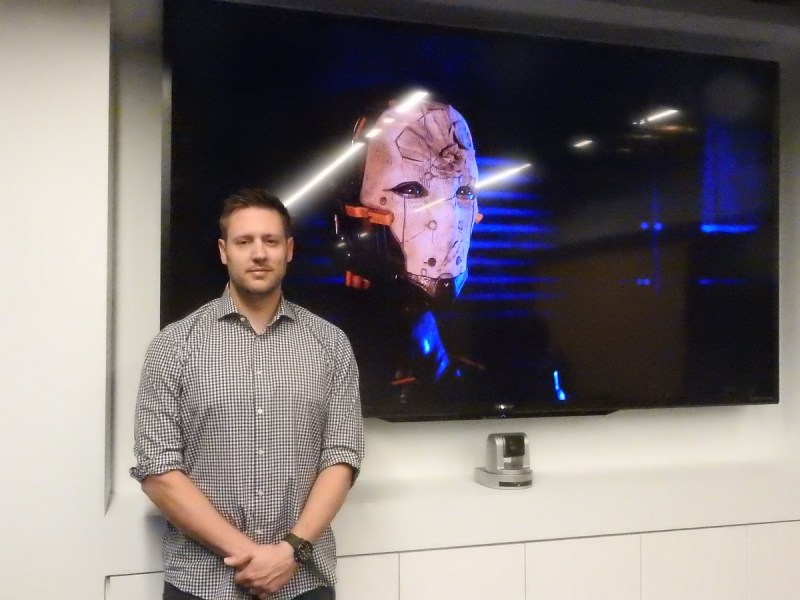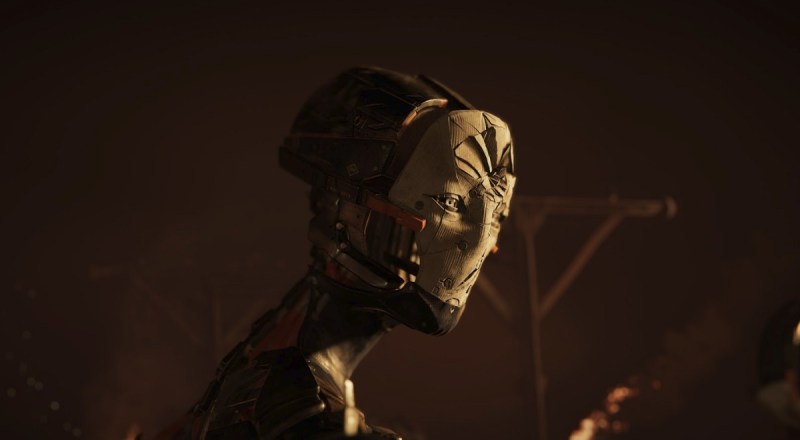Neill Blomkamp, the Academy Award-nominated director of District 9, has taken a film created with the Unity Technologies game engine and made a couple of new short films based upon it. The project means that Unity can be used to democratize film making, just as it is used to democratize game development.
Blomkamp said in an interview with GamesBeat that he was impressed with Adam, a short film that Unity built as an internally produced showcase demo last year. The film shows an Android coming to life and realizing that it was a human trapped in a robot’s body. The film was meant to show off the power of the Unity engine when it comes to making high-quality 3D graphics.
Unity asked Blomkamp if he would consider using Unity to make his next films, and he took them up on it by creating Adam: The Mirror, a short film being released today at Unity’s conference in Austin, Texas. And later this year, Blomkamp’s and Chris Harvey’s Oats Studios in Vancouver will release a second film, Adam: The Prophet, also built with Unity.

Above: Neil Blomkamp, director of District 9, created Adam: Mirror.
Blomkamp took the idea and theme of the Adam demo and ran with it. He said his team created a backstory and script for a larger Adam project, and then created the short films as a way to test the waters. If the short films resonate with viewers, then Oats Studios will consider making a full-length movie based upon Adam, Blomkamp said. The theme is about “transhumanism,” or extending human life beyond our physical bodies, said Isabelle Riva, head of Made with Unity, in an interview.
June 5th: The AI Audit in NYC
Join us next week in NYC to engage with top executive leaders, delving into strategies for auditing AI models to ensure fairness, optimal performance, and ethical compliance across diverse organizations. Secure your attendance for this exclusive invite-only event.
“Oats has a great relationship with fans, with whom they have a great rapport,” Riva said.
The new films aren’t financed by Unity, but they showcase the power of its engine to render movie-like graphics in real-time. Blomkamp said the game engine saved a lot of production time and other work. Oats Studios used Unity 2017 to build, texture, animate, light, and render the film in Unity during the past five months. Blomkamp said he viewed Unity as a virtual sandbox. Once his team shot a scene in the desert and captured it in photos through photogrammetry, he was able to create a virtual 3D scene in the desert that could be used over and over again for desert film scenes.
The ability to capture and use digital film assets more efficiently could lower the cost of making films, and that matters to an indie film studio like Oats, Blomkamp said. The film runs in real time, thanks to Unity.
“Some of the films are going to be too expensive to shoot as live-action films, and those things can be made with Unity,” Blomkamp said. “I think of the bar in Cheers [the comedy TV show], where you always return to the same place and shoot a new show.”

Above: The eyes of this robot look very human in Adam: Mirror.
“A 17-year-old trying to break into film would have an easier time with Unity,” Harvey said in an interview.
The original Adam was released in 2016 as a short film to demonstrate technical innovations on Unity. Unity started its focus on making films about four years ago, and work on the tools for Adam began a couple of years ago.
“We foresaw the evolution of the game engine in terms of how quality would bring it to a level where it could be used in film,” said Sylvio Drouin, vice president of research labs at Unity, in an interview. “Film needed to become more interactive and games needed better quality.”
Adam won a Webby Award and was screened at several film festivals including the Annecy Film Festival and the Nashville Film Festival. Adam: The Mirror picks up after the end of the events of Adam, where the cyborg hero discovers a clue about what and who he is. Adam: The Prophet gives viewers their first glimpse of one of the villains in a different part of the Adam universe.
Blomkamp said he also made District 9, a 2009 science fiction film, based on a short film, and the validation that the short film received made the bigger film possible.
“Working on this with Unity is the first film we have done at Oats with an outside party,” Blomkamp said. “We make short films and let the audience see them, and find out if it works online or not. Adam fits that mold.”
In Adam: Mirror, a bunch of robots are herded through a desert to a building. There, one of their overseers tells them they were once all humans, living in the walled city of the Consortium. They were considered criminals, and they were “cut away” from their bodies and their minds were put into the robot bodies. It’s a fascinating topic, but the second film is only six minutes long. If you like it enough, the director of District 9 is prepared to make a bigger movie out of it.
